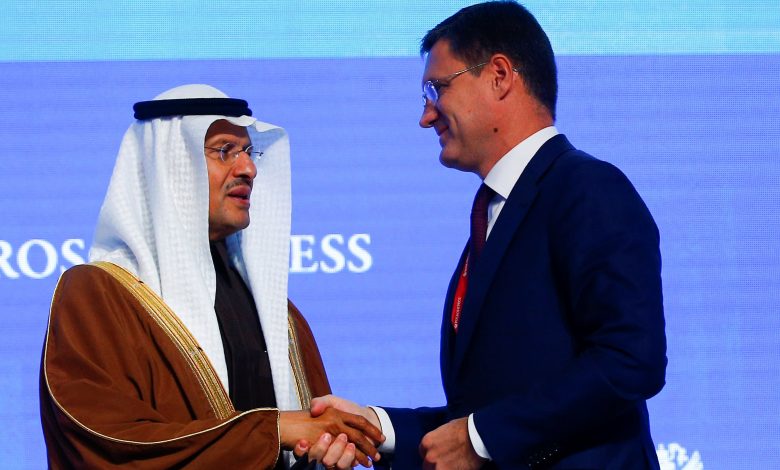OPEC+ meets to decide whether to cut output as coronavirus hits demand

[ad_1]
Minister of Energy of Russia, Alexander Novak (R) shakes hands with Saudi Arabia’s Energy Minister, Prince Abdulaziz bin Salman (L).
Anadolu Agency
Oil producing group OPEC begins a two-day meeting Thursday, along with its non-OPEC allies led by Russia, to decide whether to extend and deepen oil production cuts.
The meeting of the 14-member group OPEC and 10 non-member allies, known collectively as OPEC+, is taking place in Vienna, Austria.
OPEC ministers hold their formal meeting on Thursday which will be followed by a meeting of the broader OPEC+ alliance, including Russia, on Friday.
The gathering comes as oil prices are under pressure from weaker demand amid the coronavirus outbreak; demand last year had already been shaken by the trade war between the U.S. and China.
OPEC and non-OPEC producers, led by Saudi Arabia and Russia, first committed to curtailing their collective oil production policy back in 2016 with the deal coming into force in January 2017. Since then, it has been extended and deepened to the current cut, in which the alliance curbs oil output by approximately 1.7 million barrels per day (bpd).
Saudi Arabia also opted then to cut its own production for three months by an additional 400,000 b/d should fellow members stick to their commitments.
In February, OPEC’s joint technical committee (JTC) reportedly recommended a 600,000 bpd reduction in oil production, and an extension of the cuts to end-2020, to alleviate downward pressure on oil prices.
Russia said at the time that it had not yet decided whether to sign up to the additional cuts, however, and that position appears to have continued.
There are reports now that Saudi Arabia will push for as much as a 1.5 million bpd cut from the OPEC+ alliance but Russia’s acquiescence is not assured.
Ahead of the OPEC meeting Thursday, a panel of oil ministers including those of Saudi Arabia and Russia, met to try to hammer out a preliminary agreement over an output cut but this reportedly ended without agreement, Reuters said citing unnamed sources.
Cut priced in
The majority of analysts appear to believe that the alliance could agree on an additional cut, however; most are predicting a 1 million bpd output cut, at least. Oil prices were trading 1% higher Thursday ahead of the meeting with benchmark Brent crude trading at $51.96 per barrel and West Texas Intermediate (WTI) trading at $47.46 per barrel.
Amrita Sen, co-founder and chief oil analyst of Energy Aspects, told CNBC Thursday that oil markets could sell off if OPEC+ does not make a dramatic output cut.
“Our base case (scenario) is that they will be able to put together a cut of probably a million barrels per day,” she told CNBC’s Dan Murphy in Vienna. “But Russia’s always going to be difficult, and that’s what we’re seeing right now.”
“That’s the really tricky bit right now, I think all of us know that at some point the OPEC+ deal is not going to be exactly the same as it is today, it will become a long-term cooperation but I don’t think any of us expect that to be at this meeting.”
Sen said she was “100%” certain that markets would sell-off if a smaller output cut than expected is announced.
“We’ve already seen Brent test $50 (per barrel) last week and I think people are expecting an OPEC action. I would say a million (bpd cut) is probably priced-in right now. Anything less, or even around that, will sell off,” she said. “If they fail to deliver, I think we’ll test thirties (oil at $30 a barrel).”
Sen said OPEC was focused on “doing something very dramatic right now” safe in the knowledge that it can always reverse the cuts in the second half of the year.
The gathering of OPEC+ comes at a time when global market focus is on the spread of the coronavirus. OPEC has produced its guide of ‘dos and don’ts’ to prevent the spread of the virus, advising against shaking hands, hugging or kissing, and avoiding close contact with anyone that has a cough.
OPEC tweeted a video of its Secretary General Mohammed Barkindo
with officials and Russian Oil Minister Alexander Novak Wednesday.
Source link






